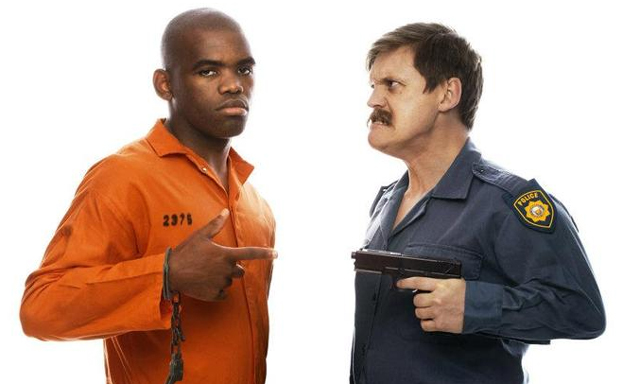 Copposites provides a fresh and uniquely South African treatment to the classic identity-switch comedy, writes Peter Machen.
Copposites provides a fresh and uniquely South African treatment to the classic identity-switch comedy, writes Peter Machen.
I have to admit that I’m not a fan of the body-switch comedy, a theme that pitches up on our screens every few years and includes such middling non-classics as Freaky Friday, Visa Versa and Big. And yet, at the Durban International Film Festival earlier this year, I found myself laughing my head off to Copposites, along with some of Durban’s most dedicated cinemaphiles.
Perhaps it has something to do with the ways in which South Africans have had to deal with race in such a complex and deliberate way, but the film produces a great deal more genuine laughs than the bulk of the genre. Telling the story of a former cop turned security guard (Rob van Vuuren) and a small-time crook (Sivuyile Ngesi) whose bodies are switched when the two men are exposed to a DNA-altering formula, the film plays gently with racially specific identities in post-apartheid South Africa, while overflowing with gloriously stupid humour and a generous helping of slapstick.
The result is one of the very few local productions capable of giving Leon Schuster a run for his money in the cross-cultural comedy market, although it should be stated that Copposites reflects a more inclusive and, oddly enough, less racially defined reality. I spoke to director Oliver Rodger and producer Carla van Wyk, as well as the film’s two stars Rob van Vuuren and Sivuyile Ngesi.
Despite Copposite‘s essentially ludicrous storyline, the film is remarkably honest in its protagonists’ responses to their new identities. Van Vuuren, perhaps best known as Twakkie from The Most Amazing Show, and Ngesi, a well-known drama actor (Copposites is his first comedy role) were already friends before they made the film, and this may have something to do with the film’s engaging fluidity. For a South African comedy, its humour is remarkably unforced. “Because Rob and I are so different”, says Ngesi, “and because our acting styles are so different, we had to meet in the middle – and the middle was honesty – because that was the only way it could work.”
Van Vuuren continues, “Ja, I guess there was mutual respect and a lot of love. And it was a lot of fun.” He continues “Why does it work? Well, we obviously thought about it a lot. Because making a film about swapping racial identities in South Africa is not an easy thing to do, and I don’t think it’s something that you can be flippant about. So we thought a lot about how that representation would happen. And as actors, we both returned to the fact that we wanted our characters to be believable – at least to ourselves – so we could have fun playing with the bizarreness of the situation.”
Director Oliver Rodger talks about his and producer Carla van Wyk’s initial concern about the fact that Van Vuuren and Ngesi wanted to perform in each other’s character’s accents. The risks were twofold – firstly, that it would simply not be convincing, and secondly, that it could slip into the kind of flat, blunt racial stereotypes that appear far too often on South African comedy screens and stand-up stages. Ngesi talks about how self-conscious he was during filming, constantly having to check with Van Vuuren and Afrikaans members of the crew as to how he was doing. “And then, when we I saw the film, I was like ‘Okay, it works!’”
As I’ve suggested, Copposites offers a more complex and nuanced answer to Leon Schuster’s phenomenally commercially successful comedy schtick that has dominated the South African box office for decades. Love him or hate him (I’m not a fan), Schuster is the only South African comedy director who can manage to make the majority of South African audiences laugh. And given his massive success, the fact that I and other critics find his oeuvre fundamentally unfunny is kind of irrelevant. So do the Copposites team think that they can challenge Schuster on his own turf? And perhaps even win over the critics?
Says Rodger, “I’m a fan of Schuster in terms of what he’s achieved. But I don’t like his films per sé. They’re not my cup of tea. Yet they’ve got a huge following, and nearly everybody likes them. Which I think is fantastic. And I personally try to emulate that, just in terms of universal comedy.” Van Vuuren responds, “You know, from a purely industry and genre-related perspective, it would be awesome if someone else could start chipping away at his monopoly of the market. So when people make the Schuster comparison, it’s kind of exciting.”
Regardless of whether Copposites manages to make headway in the monolithic task of taking on Schuster, it’s nonetheless an important film on the South African cinematic landscape, in that it’s one of the very few local films I’ve seen that can make us laugh with each other rather than at each other. And it does so without a hint of malice.
